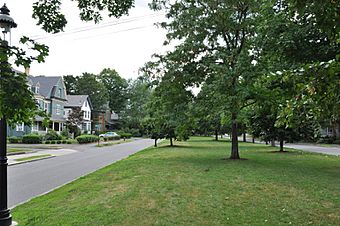Washington Park Historic District (Newton, Massachusetts) facts for kids
Quick facts for kids |
|
|
Washington Park Historic District
|
|
 |
|
| Location | Newton, Massachusetts |
|---|---|
| Area | 7 acres (2.8 ha) |
| Built | 1915 |
| Architect | Dustin Lancey; Marshall S. Rice |
| Architectural style | Gothic Revival, Italianate |
| MPS | Newton MRA |
| NRHP reference No. | 08000166 |
| Added to NRHP | March 12, 2008 |
The Washington Park Historic District is a special area in Newtonville, a village within Newton, Massachusetts. A historic district is a place where old buildings and land are protected because they are important to history. This district includes many properties built between 1870 and 1900. You can find them at 4 to 97 Washington Park, plus 5 and 15 Park Place. The main part of the district is a city park located in the middle of Washington Park street. This historic area was added to the National Register of Historic Places on March 12, 2008.
Contents
Exploring Washington Park's History
The village of Newtonville is in the center of Newton. It has a busy area near Walnut Street and the Massachusetts Turnpike. South of the highway and east of Walnut Street, you'll find a neighborhood that was planned in 1865. Houses were built there between 1870 and 1900.
How the Park Was Created
This neighborhood was developed by Dustin Lancey, a real estate developer from Newtonville. He designed it with a "pocket park," which is a small park area within a neighborhood. In Washington Park, this park is an "arborway." An arborway is a wide strip of parkland that divides the two sides of the street.
Homes for Commuters
The houses Lancey built along the park were mostly for middle-class people. These people often traveled into Boston for work using the railroad. This design made the neighborhood attractive and easy for commuters.
Architectural Styles of the Homes
The houses in the Washington Park Historic District show off different building styles. These styles were popular in the late 1800s and early 1900s. Let's look at some of them.
Second Empire Style
There are six houses in the district built in the Second Empire style. These homes were all built before 1870. A key feature of this style is the mansard roof. This is a special type of roof that has four slopes, with the lower slope being steeper than the upper one. It often has dormer windows built into it.
Queen Anne Style
The Soden House at 5 Park Place is a great example of Queen Anne architecture. It was built in 1890. Queen Anne style homes often look a bit uneven or "asymmetrical." They might have towers with unique bell-shaped roofs, decorative porches, and different textures on their walls.
Stick Style Architecture
The only Stick style house in the district is the Leavitt House at 91 Washington Park. It was built in 1870. Stick style homes are known for their decorative wooden trim on the outside. This trim often looks like a skeleton or "sticks" applied to the walls, highlighting the building's structure.
Colonial and Craftsman Mix
The newest house in the district is the Goodridge House at 27-29 Washington Park. It's a duplex, meaning it has two separate living units. Built in 1914, this house combines elements of both Colonial and Craftsman styles. Colonial style often features simple, balanced designs. Craftsman style focuses on natural materials and handmade details.
 | Anna J. Cooper |
 | Mary McLeod Bethune |
 | Lillie Mae Bradford |



